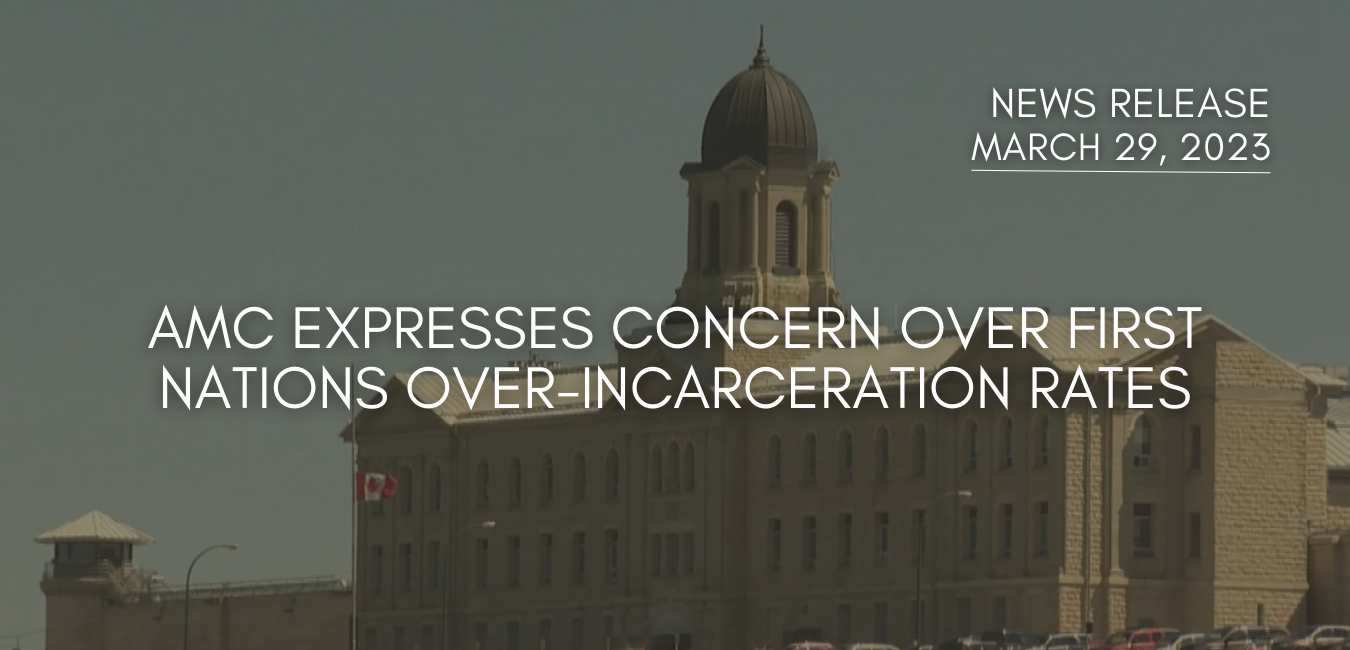AMC Expresses Concern Over First Nations Over-Incarceration Rates

March 29, 2023
Treaty One Territory, Manitoba
AMC Communications
Treaty One Territory, MB – The Assembly of Manitoba Chiefs (AMC) issues the following statement on the over-incarceration of First Nations Citizens in Manitoba. On March 17, 2023, the Winnipeg Free Press published an article about Ethan Wildcat, a First Nation man who was handed a harsher sentence then a non-First Nations man facing similar charges. In this case, and in many others like it, discretionary sentencing powers are underused when it comes to First Nation offenders. The Assembly of Manitoba Chief is concerned that Indigenous offenders are penalized more than non-Indigenous offenders due to the concept of exceptional circumstances being vague and devoid of precise definitions.
Grand Chief Cathy Merrick says, “The problem with current case law is that judges are determining what constitutes exceptional circumstances based on their own bias and perspectives. This is extremely concerning as it results in unnecessarily harsh incarceration rates. First Nation Citizens continue to encounter extreme bias in sentencing due to colonial perceptions that pervade all levels of the so-called ‘Justice System’.”
It is imperative that the courts properly consider just how exceptional it is when First Nation individuals, such as Ethan Wildcat, make positive changes within the context of their lived experience and circumstances, despite the intergenerational effects of colonial trauma. The importance of just considerations not only means diminishing over-incarceration rates but decreases the chance of wrongful conviction, as in the case of two First Nation sisters who are being released after serving 30 years for excessive and wrongful conviction. It is unacceptable that the courts fail to appropriately recognize the rarity and exceptional nature of these types of successes, robbing defendants of their right to just considerations. To this day, First Nations people continue to be jailed younger, denied bail more frequently, granted parole less often, over-represented in segregation, over-represented in remand custody and are more likely to be classified as high-risk offenders.
In 1999, R. v. Gladue (Gladue) became the first case where the Supreme Court of Canada (SCC) recognized that the over-incarceration of First Nation offenders required additional considerations, stating, “the figures are stark and reflect what may be termed a crisis in the Canadian criminal justice system”. Gladue stated that those sentencing judges play an important role in reconciling injustice against First Nation peoples in Canada. These sentencing judges determine most directly whether a First Nation offender will go to jail or whether they may opt for other sentencing options, which will play a strong role in restoring balance to the offender, victim, and community and in preventing future crime.
A First Nation-led pilot court is currently being developed by AMC, with the goal of providing a model that can be used by all First Nations in Manitoba to eventually take back jurisdiction over justice.
The Chiefs Committee on Restorative Justice and Policing has identified two First Nations for recommendation who are considering this work. Furthermore, AMC is working on a Legal Restoration and Revitalization project to restore and revitalize the legal traditions and laws respecting the five Nation/Language groups in Manitoba: the Anishinaabe (Ojibway), Nehetho / Ininew (Cree), Anishininew (Ojibwe-Cree), Denesuline (Dene) and Dakota Oyate (Dakota) people. First Nations laws and justice systems are being gathered for this project. After the information is gathered and analyzed, template laws will be developed for use by all First Nations in Manitoba in order to create and improve their own justice systems. These projects and others show that there is work being done to counter the overincarceration of First Nation citizens. The solution to these issues is for the province to accept proposed processes for First Nations, by First Nations.
“We call on the Manitoba Department of Justice to work with First Nations in developing a better-informed sentencing procedure for First Nation Citizens, ensuring it is carried out with adequate cultural and contextual considerations,” says Grand Chief Merrick.
For more information, please contact:
Communications Team
Assembly of Manitoba Chiefs
Email: media@manitobachiefs.com
About the Assembly of Manitoba Chiefs
The AMC was formed in 1988 by the Chiefs in Manitoba to advocate on issues that commonly affect First Nations in Manitoba. AMC is an authorized representative of 62 of the 63 First Nations in Manitoba with a total of more than 151,000 First Nation citizens in the province, accounting for approximately 12 percent of the provincial population. AMC represents a diversity of Anishinaabe (Ojibway), Nehetho / Ininew (Cree), Anishininew (Ojibwe-Cree), Denesuline (Dene) and Dakota Oyate (Dakota) peoples.